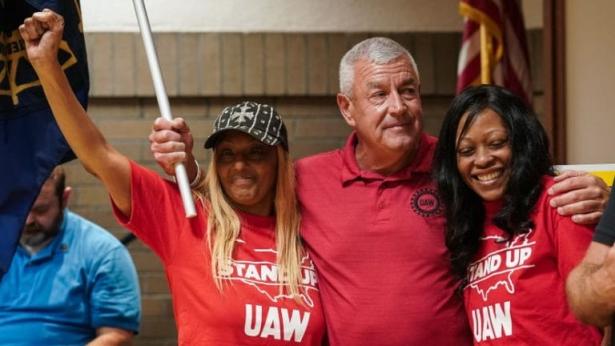The next test will be a UAW election scheduled for the week of May 13 at a Mercedes-Benz factory in Alabama, a state that has attracted so much auto investment it has earned the nickname “the Detroit of the South.”
If the roughly 5,000 Mercedes workers vote to unionize, the ripple effects could empower workers nationwide.
For decades, Southern states have pursued “low-road” development strategies, luring investors with massive public subsidies and repressive labor policies. This has pitted workers in different regions against each other, undercutting their ability to secure fair compensation.
Alabama has spent $1.6 billion to woo Mercedes, along with Toyota, Hyundai, and Honda. All these foreign companies’ operations in the South are non-union, in contrast to the unionized Big Three of Ford, GM, and Stellantis.
This foreign investment has created thousands of Alabama jobs — but with weak worker protections, the state remains one of the nation’s poorest. And while these companies have enjoyed rising corporate profits, they have left workers behind.
An in-depth report by the nonprofit group Alabama Arise found that inflation-adjusted average pay for the state’s autoworkers has dropped by 11 percent over the past 20 years to $64,682. By contrast, CEO pay stands at $13.9 million at Mercedes and $6.9 million at Toyota.
The foreign-owned firms’ payrolls also reflect Alabama’s long history of racial discrimination, with Black and Latino workers earning substantially less than their white counterparts. By contrast, the Economic Policy Institute has found that union workers make 10.1 percent more on average than non-union workers.
The benefits are even greater for workers of color. Unionized Black workers make 13.1 percent more than non-union Black workers in comparable jobs, and Latino union members make 18.8 percent more than non-union Latino workers.
Equitable pay practices boost local economies by putting more money in workers’ pockets for groceries, housing, and other goods and services from local businesses. And that’s good for families of every color.
But Alabama Governor Kay Ivey doesn’t see things that way. Before the UAW vote in Tennessee, she joined GOP governors from Georgia, Mississippi, South Carolina, Tennessee, and Texas to discourage VW workers from voting yes with unfounded threats of mass layoffs.
When 73 percent of those autoworkers voted for the UAW, it was a strong rebuke of the region’s low-road, anti-worker model. So corporate lobbyists in the region have further enlisted state legislators and cabinet officials in a sustained campaign to blunt organizing momentum.
How will the election turn out in Alabama?
A new poll indicates that 52 percent of residents in this deep-red state support the autoworkers’ union drive, while just 21 percent are opposed. This echoes a 2022 poll commissioned by the Institute for Policy Studies in Jefferson County, Alabama, where workers were attempting to unionize an Amazon warehouse in Bessemer. That survey showed nearly two-thirds support.
While the Alabama Amazon campaign fell short in the face of aggressive anti-union tactics, increased public approval of unions is a testament to many years of community and labor organizing.
The fact that a large majority of workers at the Mercedes-Benz plant signed petitions earlier this year in support of the election is encouraging. We need a New South economic structure based on fairness and equity. Organized labor is an essential partner in that mission.
===
Marc Bayard directs the Black Worker Initiative at the Institute for Policy Studies. Dev Wakeley is Alabama Arise’s worker policy advocate. This op-ed was distributed by OtherWords.org.


Spread the word